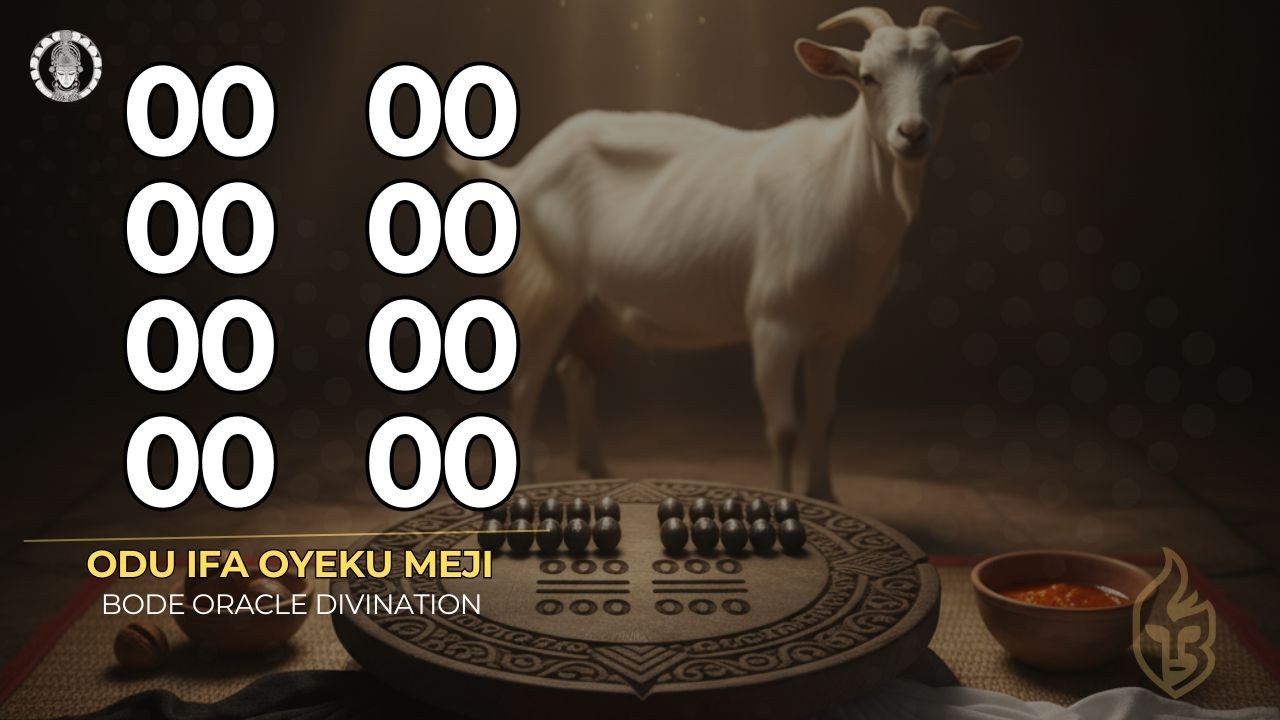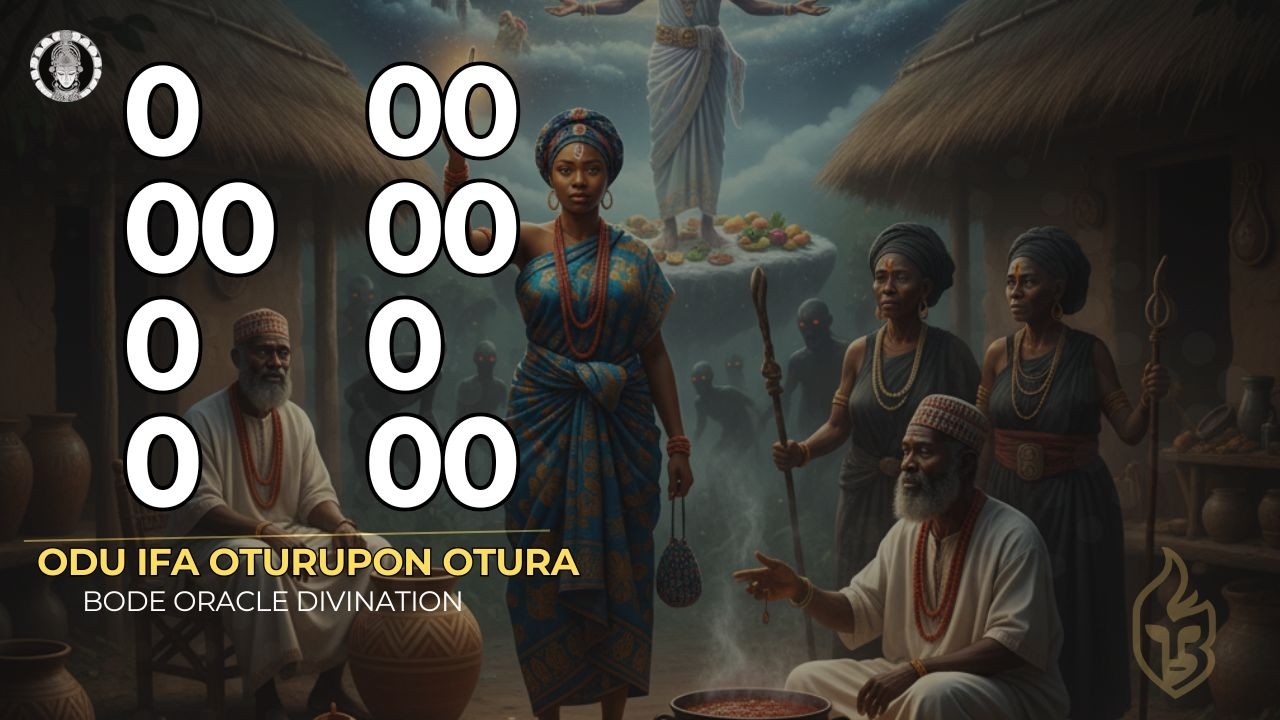Introduction to Odu Ifa Oturupon Otura (Oturupon Atura)
Odu Ifa Oturupon Otura, also known as Oturupon Atura, stands as one of the 256 sacred divination signs in the Ifa corpus, carrying profound teachings about victory over adversaries, the maintenance of spiritual communities, and the strategic use of sacrifice to transform opposition into triumph. This powerful Odu speaks directly to those who find themselves surrounded by enemies, facing organized opposition, or seeking to secure blessings that seem blocked by external forces.
What distinguishes Oturupon Otura is its emphasis on resilience and the refusal to be broken. The recurring phrase "I am the child of one who refuses to be broken" establishes not just a statement of determination but a spiritual identity rooted in ancestral strength. This Odu teaches that victory comes not through brute force or direct confrontation, but through strategic spiritual preparation, proper sacrifice, and the cultivation of both earthly and celestial alliances.
The four divinations within Oturupon Otura address different dimensions of spiritual warfare and blessing: Ofafa teaches victory through animal sacrifice and resilience, Ebure reveals how to defeat organized enemies through precision and spiritual binding, Momoponjimon instructs on maintaining celestial communities for continuous blessing, and Orunmila demonstrates the necessity of peaceful relations with powerful spiritual forces like the Iyami. Together, these teachings provide a comprehensive strategy for achieving and maintaining victory in all areas of life. For comprehensive understanding of the foundational Odu Ifa system, explore our complete directory.
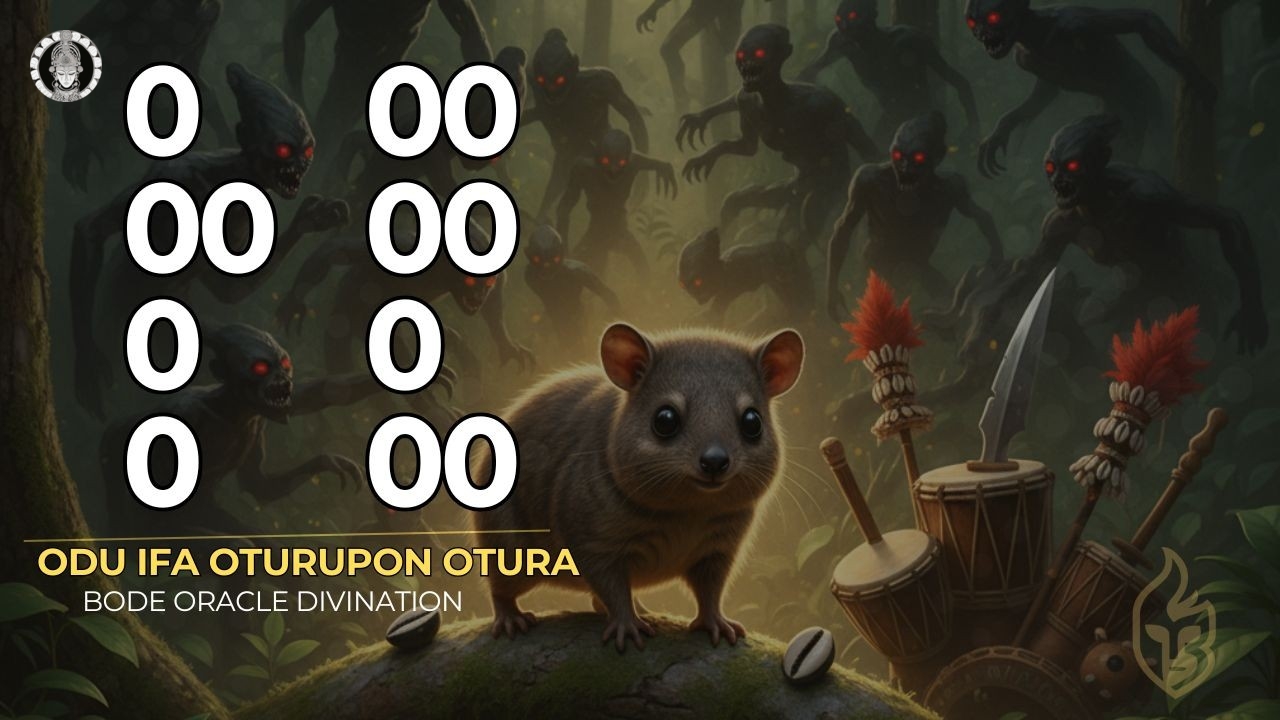
Ifa Divination for Ofafa: The Blessing of Unbreakable Victory
Understanding the Message of Resilient Triumph
This divination from Oturupon Otura addresses a situation that many face: being surrounded by enemies who seek to destroy or diminish one's position. Ifa reveals that the person receiving this Odu is destined for victory, but this triumph is not automatic—it requires specific sacrificial action. The divination promises that through proper offering, one will overcome multiple adversaries and emerge victorious despite being outnumbered or outmatched by conventional measures.
The choice of Ofafa (the tree hyrax or tree dassie) as the central figure carries deep symbolic meaning. This small but remarkably resilient animal lives in trees and rocky outcrops, often in colonies that defend themselves collectively against much larger predators. The Ofafa represents the wisdom of strategic positioning, collective defense, and the ability to thrive in elevated places where larger, more aggressive competitors cannot easily reach. This teaches that victory comes not from matching enemy strength but from occupying spiritual and strategic positions where enemies cannot effectively attack.
The Power of Inherited Resilience
The opening declaration "I am the child of one who refuses to be broken" establishes a profound spiritual principle. This is not merely self-affirmation but the invocation of ancestral resilience. In Yoruba cosmology, we inherit not just physical traits but spiritual qualities from our lineage. By declaring oneself as the child of the unbreakable, one connects to a stream of ancestral strength that has survived countless challenges. This inherited resilience becomes an active force in the present struggle, transforming the person from a potential victim into a destined victor.
The Sacred Verse
Tuwetuwe ni ru gbo
Emi omo eni toni ki tuwa
Adifafun ofafa nigba ti niragun ota
Ebo ni won ni kose
Osigbebo ni be orubo
Nje iwo ofafa foun soke mongboo
Ifa n ba o segun bowa o
Iwo ofafa foun soke mon gboo o
English Translation
"Tuwetuwe ni ru gbo"
I am the child of one who refuses to be broken.
This was the Ifá divination for Ofafa,
When it was surrounded by enemies.
It was advised to offer a sacrifice,
And it complied.
Thus, the blessing of help from Ofafa is upon me.
I heard you bringing victory.
You help me, so I may help myself.
The Principle of Reciprocal Victory
The final lines of the verse reveal a sophisticated understanding of spiritual assistance. The phrase "You help me, so I may help myself" teaches that divine assistance and human effort work in partnership. Ifa does not promise to do everything for the person; rather, it promises to provide the spiritual support necessary for the person to achieve their own victory. This maintains human agency and responsibility while acknowledging the necessity of spiritual backing. The sacrifice creates a relationship of mutual support between the person and spiritual forces.
Understanding Multiple Adversaries
The divination specifically addresses being "surrounded by enemies" (niragun ota), indicating not a single opponent but multiple adversaries working against the person. This could manifest as workplace coalitions, family members united in opposition, competitive business rivals, or spiritual forces aligned against one's progress. The prescription of three roosters is significant—each rooster represents victory over a different dimension or group of enemies. The number three also invokes completeness, suggesting that victory will be comprehensive, leaving no enemy undefeated.
Prescribed Offerings (Ebo)
For those receiving this divination, Ifa prescribes three roosters (akuko adire meta), which represent authority, announcement of victory, and the spiritual power to dominate adversaries. Ofafa meat connects the person to the resilience and strategic wisdom of this animal. Palm oil (epo) facilitates spiritual communication and smooths the path to victory. Eko (fermented corn pudding) nourishes spiritual forces and demonstrates commitment. Kola nuts (obi) open spiritual doors and invite blessing. A substantial amount of money (owo) ensures that all practical and spiritual dimensions of the sacrifice are properly addressed. For deeper understanding of how Ifa divination functions as a comprehensive knowledge system, consult UNESCO's documentation of Ifa as an intangible cultural heritage.
Practical Application for Modern Times
In contemporary contexts, this divination speaks to anyone facing opposition from multiple sources—whether in professional competition, legal disputes, family conflicts, or social challenges. The enemies need not be individuals; they can be systemic obstacles, discriminatory structures, or collective forces working against one's advancement. The Odu teaches that victory requires both spiritual preparation through sacrifice and the cultivation of inner resilience that refuses to accept defeat. Learn more about related Odu teachings at our Ogunda Oturupon page.
Ifa Divination for Ebure: Victory Through Precision and Spiritual Binding
Confronting Organized Opposition
This divination from Oturupon Otura presents a situation where the person faces not random or scattered enemies, but organized, coordinated opposition. The phrase "awon kan ni won gbogun ti eleyi" (a group of people are waging war against them) indicates deliberate, strategic attack from multiple coordinated sources. This represents a more sophisticated level of opposition than mere multiple enemies—these are adversaries who have united with a common purpose to defeat the person.
Ebure, identified as the servant of Ikoku Olofin, represents the position of many people who find themselves targeted not because of their own actions but because of their associations, positions, or the roles they occupy. The fact that Ebure is a servant teaches that even those without high positions can face significant opposition and can achieve complete victory through proper spiritual preparation.
The Sacred Verse
Botewure kotewure
Bonaagbaja onaagbaja
Adifafun Ebure tise eru ikoku olofin
Igba ti n be laarin ota
Ebo ni won ni kose
Osigbebo ni be orubo
Ero Ipo
Ero Ofa
Nje abere tolokun nidi kinugbeee
English Translation
Botewure Kotewure, Bonaagbaja Onaagbaja
This was the Ifá divination for Ebure, the Servant of Ikoku Olofin,
When he was surrounded by enemies.
He was advised to offer a sacrifice,
And he complied.
Pilgrims from Ipo,
Pilgrims from Ofa,
Thus, a needle with thread is never lost.
The Symbolism of the Needle
The prescription of "many needles" (opolopo abere) alongside a goat carries profound symbolic and practical significance. In Yoruba spiritual practice, needles represent several critical qualities: precision in action, the ability to penetrate defenses that appear impenetrable, the power to bind things together or separate them, and the sharpness necessary to pierce through opposition. The verse's conclusion that "a needle with thread is never lost" teaches that when properly connected to spiritual guidance (the thread), one maintains direction and cannot be separated from protection and victory.
Needles also represent the surgical precision needed when facing organized enemies. Unlike blunt force, which might scatter enemies temporarily, the needle's precision allows for targeted action that dismantles opposition systematically. In spiritual warfare, this means addressing each enemy or aspect of opposition with specific, focused spiritual power rather than general, diffused energy.
Understanding Reciprocity and Self-Reliance
The phrase "Botewure Kotewure, Bonaagbaja Onaagbaja" which appears in this and other divinations within Oturupon Otura, expresses a philosophy of self-reliance through spiritual preparation. It can be interpreted as "whether you help or not, whether you struggle or not"—emphasizing that one's victory does not depend on the assistance or goodwill of others but on proper relationship with spiritual forces through sacrifice. This teaching is particularly relevant when facing organized opposition, as it removes dependence on allies who may be intimidated or coerced by enemies.
The Geographic References
The mention of "pilgrims from Ipo" and "pilgrims from Ofa" is significant. These were ancient Yoruba towns associated with Ifa practice and divination. By invoking pilgrims from these sacred centers, the verse establishes spiritual witnesses to the victory—those who travel for spiritual purposes will testify to the effectiveness of proper sacrifice. This also suggests that the person's victory will become known beyond their immediate context, serving as testimony to others facing similar opposition.
Prescribed Offerings (Ebo)
For victory over organized enemies, Ifa prescribes one goat (eran oruko kan), representing substitution and the power to appease spiritual forces that might support enemies. Many needles (opolopo abere) provide the precision and binding power necessary for systematic victory. Palm oil (epo) smooths spiritual communications. Eko (fermented corn pudding) nourishes protective forces. Kola nuts (obi) open channels of blessing and close channels through which enemies might attack. For scholarly perspectives on the mathematical and systematic nature of Ifa divination, see research on the algebraic characterization of Ifa divination codes.
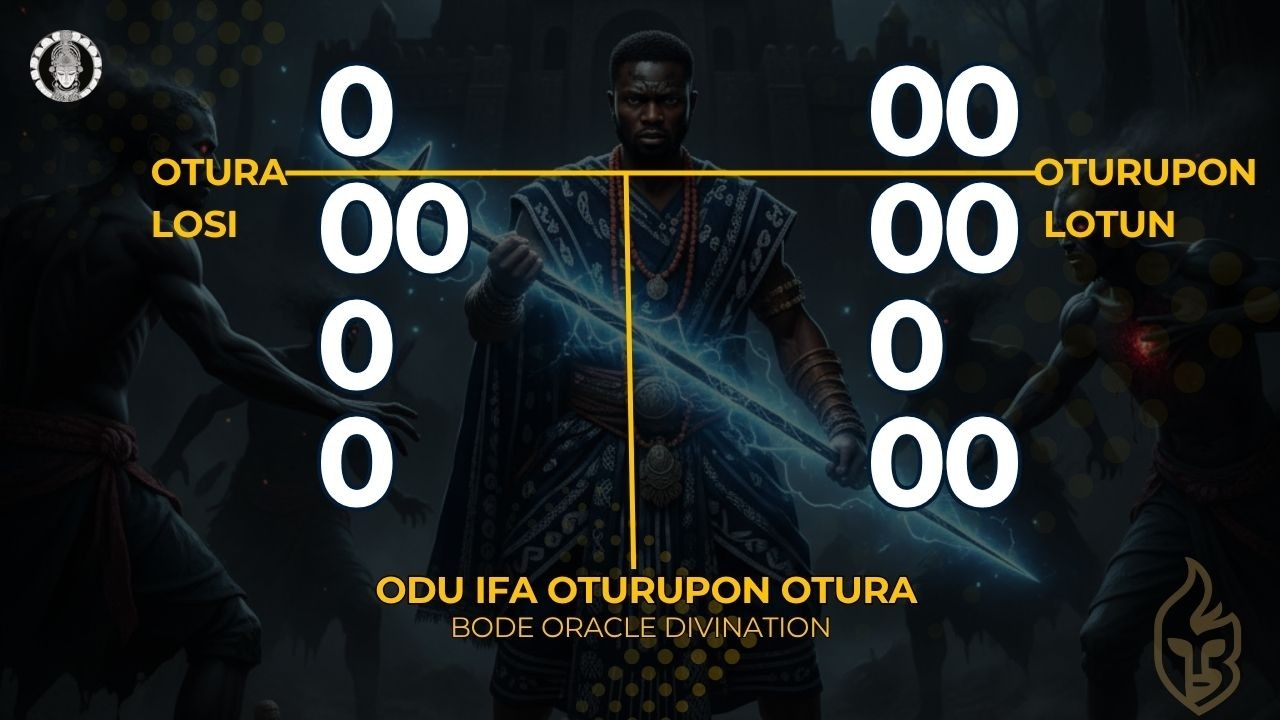
Ifa Divination for Momoponjimon: Nourishing Celestial Communities for Continuous Blessing
Understanding the Egbe Orun Concept
This divination from Oturupon Otura introduces one of the most profound concepts in Yoruba spirituality—the Egbe Orun, or celestial community. Ifa reveals that before we descended to earth, we belonged to spiritual communities in the heavenly realm. These communities continue to exist and maintain interest in our earthly success and wellbeing. However, just as earthly relationships require maintenance and nurturing, so too do our relationships with our celestial companions.
Momoponjimon is identified as "Olori Egbe lode Orun" (the leader of the community in the heavens), representing the organizing principle or chief representative of one's spiritual community. This teaches that celestial communities have structure and leadership, and that communicating with them requires understanding proper protocols. The divination addresses the situation where someone cries out for blessings (momi oju sogbere ire gbogbo) but finds those blessings delayed or blocked—not because they are undeserved, but because the spiritual community that should facilitate them has been neglected.
The Sacred Verse
Botewure kotewure
Bonaagbaja onaagbaja
Adifafun Momoponjimon tise
Olori egbe lode orun
Igba ti momi oju sogbere ire gbogbo
Ebo ni won ni kose
Osigbebo ni be orubo
Nje mon mon jimon pere fun wa
Mon mon jimon pere fun wa ooo
English Translation
Botewure Kotewure,
Bonaagbaja Onaagbaja
This was the Ifá divination for Momoponjimon,
The leader of the community in the heavens.
When he cried out for the blessing of all goodness,
He was advised to offer a sacrifice,
And he complied.
Thus, Momoponjimon will share blessings with us all.
Do not stray too far from us.
The Plea for Continued Connection
The final lines "Mon mon jimon pere fun wa" (Momoponjimon will share blessings with us all, do not stray too far from us) reveal a reciprocal relationship between the earthly person and their celestial community. While we need their support, they also desire connection with us. This teaches that spiritual communities in the heavenly realm take pleasure in the success of their earthly members and wish to remain connected through the channel of sacrifice and acknowledgment.
The plea "do not stray too far from us" also carries a warning about the dangers of becoming so absorbed in earthly pursuits that one loses connection with spiritual sources of blessing. Material success without spiritual maintenance often proves unstable and temporary. By maintaining connection with one's Egbe Orun, blessings flow continuously rather than sporadically.
Why Blessings Are Blocked
This divination addresses a common frustration: praying, working hard, and crying out for blessings, yet seeing no results. Ifa reveals that often the blockage is not in the heavens' unwillingness to bless but in the broken or neglected communication channels. When we fail to acknowledge and nourish our spiritual communities, they cannot effectively channel blessings to us, not out of spite but because the spiritual pathway has not been maintained.
The prescription of both a goat and a pigeon is significant. The goat represents a substantial offering that addresses major blockages and reestablishes serious commitment to the relationship. The pigeon, gentler and more frequent in traditional offerings, represents the ongoing, regular maintenance that should follow the initial restoration of the relationship.
Prescribed Offerings (Ebo)
For reconnection with celestial communities and the flow of blessings, Ifa prescribes one goat (eran oruko kan), which reestablishes severed spiritual connections and demonstrates serious commitment to the relationship. One pigeon (eyele kan) represents peace, gentle communication, and the ongoing offerings that maintain the relationship after initial restoration. Palm oil (epo) facilitates smooth spiritual communication. Eko (fermented corn pudding) nourishes spiritual forces. Kola nuts (obi) open spiritual pathways and invite blessing.
Modern Application
In contemporary life, this divination speaks to those who feel their blessings are mysteriously blocked despite doing everything apparently correct. It teaches that success requires not just earthly effort but spiritual maintenance. Many people in modern contexts have lost awareness of their spiritual communities, focusing exclusively on material strategies for advancement. This Odu reminds us that we are never truly self-made—our success depends on both visible and invisible support systems that require acknowledgment and care.
Ifa Divination for Orunmila: The Wisdom of Alliance With Powerful Forces
Understanding the Iyami Osoronga
This divination from Oturupon Otura presents one of the most critical teachings in Ifa practice—the necessity of maintaining peaceful, respectful relations with the Iyami Osoronga, often translated as "the mothers" or colloquially referred to as witches. These are powerful spiritual forces associated with feminine creative and destructive power, with the ability to either facilitate or block virtually any endeavor. The Iyami represent the primordial feminine principle that existed before creation itself, and their power is absolute within certain domains.
What makes this divination particularly significant is that it involves Orunmila himself—the deity of wisdom and divination—going to make a pact with the Iyami "in the backyard" (bawon eleye mule lagbala). The backyard represents the hidden, private space where serious spiritual business is conducted away from public view. This teaches that even the wisest spiritual authority must acknowledge and work with forces that operate in realms beyond pure wisdom—forces of raw power, emotion, and primordial authority.
The Sacred Verse
Tuwatuwa ni mogbo
Emi omeni toni ki tuwa
Adifafun orunmila
Baba n lo re bawon eleye mule lagbala
Ebo ni won ni kose
Osi gebo ni be orubo
Nje ewure yin re o
Eyin iyami edakun edabo
Efi ye dee nuuu.
English Translation
Tuwatuwa ni mogbo
Emi omeni toni ki tuwa
This was the Ifá divination for Orunmila,
When he was to go and make a pact with them
In the backyard.
He was advised to offer a sacrifice,
And he complied.
Therefore, here is your goat.
Oh, great witches, please, please, please, and please.
The Power of Humility Before Greater Forces
The most striking element of this verse is the repeated plea: "edakun edabo" (please, please, please, and please). This fourfold repetition of "please" from Orunmila—the embodiment of wisdom itself—teaches a profound lesson about spiritual hierarchy and the wisdom of humility. There are forces in the cosmos that do not respond to commands, logical arguments, or even wisdom itself. They respond to respect, acknowledgment, and proper offerings accompanied by genuine humility.
The translation "oh, great witches" (eyin iyami) uses the respectful plural form, acknowledging both the collective nature of this force and according it the honor due to powerful spiritual entities. This demonstrates that effective spiritual practice requires the wisdom to know when to assert authority and when to show deference. Victory and blessing often depend not on domination but on strategic alliance with forces that could otherwise oppose us.
The Special Preparation for Iyami
Ifa instructs that a goat must be offered to Ifa, but critically, its intestines (and other internal organs) must be prepared as a special meal for the Iyami. This specific instruction reveals sophisticated understanding of spiritual diplomacy. The goat's sacrifice to Ifa establishes one's standing as a proper practitioner, but the preparation of its interior parts for the Iyami acknowledges their domain over internal, hidden, and transformative processes.
The intestines represent the processing center where transformation occurs—food becomes nourishment or waste, potential becomes reality or illusion. By offering these specific parts to the Iyami, one acknowledges their power over transformation itself. This is not mere symbolism but a practical spiritual technology that aligns one's spiritual practice with the forces that govern manifestation and transformation.
Why This Alliance Matters
The divination teaches that many people fail to achieve victory or maintain blessings because they attempt to bypass or ignore the Iyami. Some fear them, others dismiss them, and still others believe that male-dominated spiritual practices alone suffice for protection and success. Ifa reveals this as dangerous folly. The Iyami's power is such that they can unravel any blessing, block any achievement, and frustrate any plan if they are not properly acknowledged and appeased.
However, when properly approached with respect and appropriate offerings, the Iyami become powerful allies who facilitate the very transformations one seeks. They can open doors that wisdom alone cannot unlock, transform enemies into supporters, and ensure that blessings once received remain stable and multiply. For understanding the broader cultural and spiritual context of Yoruba divination, explore comprehensive documentation of the Ifa system.
Prescribed Offerings (Ebo)
For alliance with the Iyami and comprehensive spiritual protection, Ifa prescribes one goat (eran ewure kan) to be offered to Ifa, with its intestines and other internal organs specially prepared as a meal for the Iyami Osoronga. Palm oil (epo) facilitates communication with these powerful forces. Eko (fermented corn pudding) demonstrates ongoing commitment. Kola nuts (obi) open spiritual pathways and secure their favor.
Critical Warning
This divination and its prescriptions must only be performed under the direct guidance of a qualified and experienced Babalawo who has proper knowledge of how to approach the Iyami. Improper approach to these forces can result in spiritual complications rather than blessings. The power being addressed here is absolute in its domain, and respect must be genuine rather than performative.
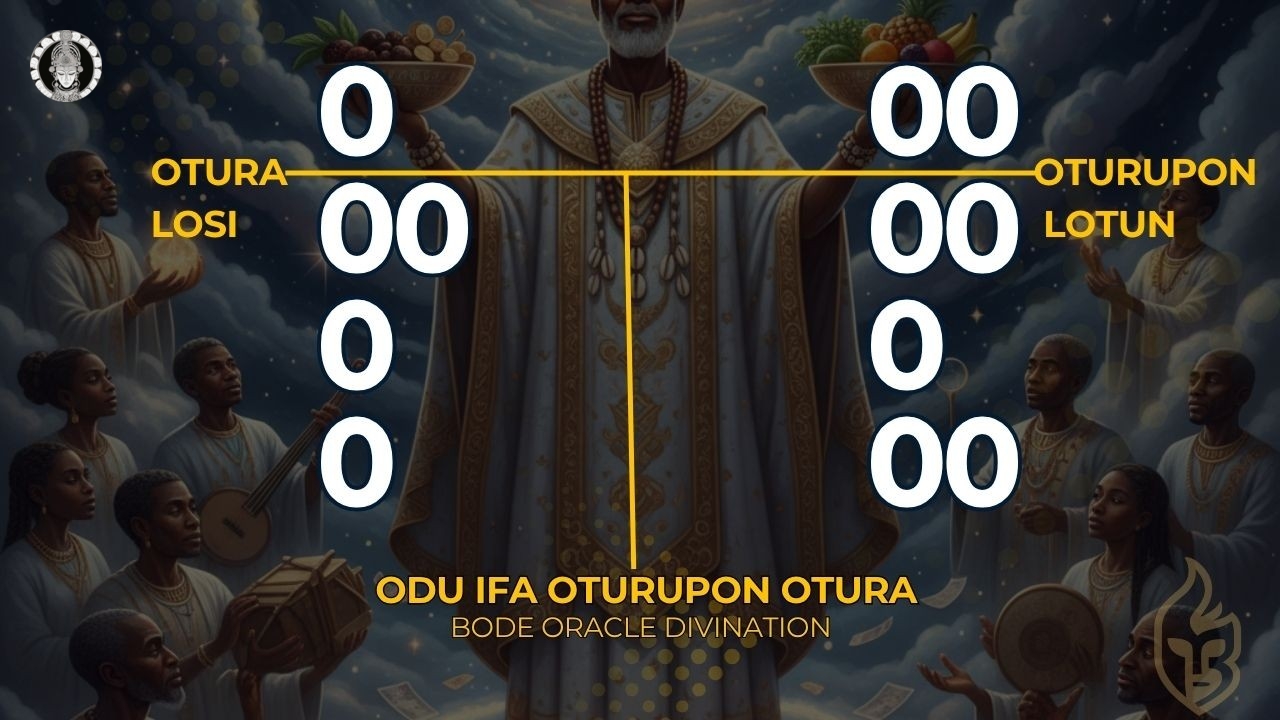
Additional Resources
Internal Links
- Complete Guide to Oturupon Otura - Detailed information, taboos, and practices
- Ogunda Oturupon - Related Odu teachings
- Bode.ng Blog - Extensive collection of Ifa and Yoruba spirituality articles
- Complete Odu Ifa Directory
- Bode Oracle - Divination services and community
External Resources
- African Traditional Religions: Ifa Divination - Duquesne University
- Ifa Divination System - Wikipedia
- Ifa of the Yoruba People of Nigeria - UNESCO Archives
- Algebraic Characterization of Ifa Main Divination Codes
- Ifa Divination System: An Artistic Expression of Yoruba Knowledge Creation
- UNESCO Recognition of Ifa Divination System
Connect With Us on Social Media
- BODE Oracle on TikTok
- BODE Oracle on YouTube
- BODE Oracle on Facebook
- BODE Oracle on X (Twitter)
- BODE Oracle on Pinterest
Visit Bode.ng to explore more divination teachings, participate in quizzes and polls, and connect with our community of practitioners and learners. Register today to access exclusive content and personalized guidance on your spiritual journey.
Frequently Asked Questions And Answers About Odu Ifa Oturupon Otura (Oturupon Atura)
Find answers to common questions about this sacred Odu Ifa and its divination teachings
Oturupon Otura, also called Oturupon Atura, is one of the 256 sacred Odu in the Ifa corpus. It carries powerful messages about achieving victory over enemies, maintaining spiritual communities, and securing protection through proper sacrifice. This Odu emphasizes resilience, the refusal to be broken by opposition, and the importance of spiritual alliances with both earthly and celestial forces.
Oturupon Otura promises victory through specific sacrifices. The divination of Ofafa teaches that when surrounded by enemies, offering three roosters along with Ofafa meat ensures triumph. The divination of Ebure reveals that when facing organized opposition, offering a goat with needles secures victory. These sacrifices, combined with proper spiritual practice, transform opposition into opportunity for triumph.
The Ofafa (tree hyrax or tree dassie) in Oturupon Otura represents resilience and adaptability in the face of danger. This small but tenacious animal lives in trees and rocky areas, symbolizing the ability to find safety in elevated spiritual positions. The use of Ofafa meat in sacrifice connects the person to these qualities of survival, strategic positioning, and the ability to overcome larger, more numerous adversaries through wisdom rather than brute force.
The needles in the Ebure divination carry profound symbolism. The verse states "a needle with thread is never lost," teaching that when properly connected to spiritual guidance, one cannot be separated from protection and victory. Needles represent precision, the ability to penetrate defenses, and the power to bind things together or keep them apart. In spiritual warfare, needles symbolize the sharp focus needed to defeat organized enemies and the ability to sew up vulnerabilities in one's own spiritual defenses.
The divination of Momoponjimon reveals that everyone has a celestial spiritual community (Egbe Orun) that must be nourished for blessings to flow. This Odu teaches that we are never truly alone—we have spiritual companions and supporters in the heavenly realm who work on our behalf. However, this relationship requires maintenance through sacrifice, particularly offerings of pigeons and goats. When we neglect our spiritual community, blessings are delayed or blocked.
The divination of Orunmila in this Odu reveals the critical importance of maintaining peaceful relations with the Iyami Osoronga (the mothers, often called witches). Ifa instructs that a goat must be offered to Ifa, and its intestines prepared as a special meal for the Iyami. This demonstrates that victory and blessing require acknowledgment of and cooperation with these powerful spiritual forces. The verse's repeated plea "please, please, please" shows the necessity of humility and respect when dealing with the Iyami.
This powerful declaration from the Ofafa verse establishes spiritual identity and inherited resilience. It teaches that those receiving this Odu come from a lineage of survivors who refused to yield to opposition. This is not merely about physical survival but about maintaining one's spiritual integrity and purpose despite external pressure. The phrase empowers the person to see themselves as inheritors of unbreakable determination, which itself becomes a source of victory.
All sacrifices in Oturupon Otura should be performed under the guidance of a qualified Babalawo who can invoke the necessary prayers and ensure proper procedures. The sacrifices require specific combinations: for Ofafa (three roosters plus Ofafa meat), for Ebure (one goat plus many needles), for Momoponjimon (one goat plus one pigeon), and for Orunmila (one goat with special preparation of intestines for Iyami). Each sacrifice addresses different dimensions of protection and victory.
This phrase, which appears in multiple divinations within Oturupon Otura, represents the concept of reciprocity and mutual support. It can be understood as "whether you help or not help, whether you struggle or do not struggle." The repetitive structure emphasizes that regardless of external circumstances or the actions of others, those who perform the prescribed sacrifices will receive their blessings. It teaches self-reliance through spiritual practice rather than dependence on human support alone.
Oturupon Otura emphasizes several behavioral principles: refuse to be broken by opposition (maintain resilience), acknowledge and work with spiritual forces rather than ignoring them, maintain your spiritual communities through regular offerings, approach powerful spiritual entities with humility and respect, and understand that victory comes through strategic spiritual preparation rather than direct confrontation. The Odu teaches that proper conduct combined with proper sacrifice ensures triumph over any adversary.
In contemporary life, Oturupon Otura speaks to situations of workplace opposition, legal disputes, competitive environments, social conflicts, and any circumstance where one faces organized or multiple adversaries. The "enemies" can be understood as competitors, detractors, systemic obstacles, or negative forces working against one's progress. The Odu's teachings about strategic sacrifice, spiritual alliances, and resilience remain fully relevant to modern struggles for success and recognition.
Explore comprehensive information through: Complete Guide to Oturupon Otura at bode.ng/oturupon_otura, Complete Odu Ifa Directory at bode.ng/odu/, Bode.ng Blog at bode.ng/blogs for extensive Ifa spirituality articles, and Bode.ng at bode.ng for divination services and community resources. Connect with us on social media for regular teachings: TikTok, YouTube, Facebook, X (Twitter), and Pinterest @BODEOracle.
